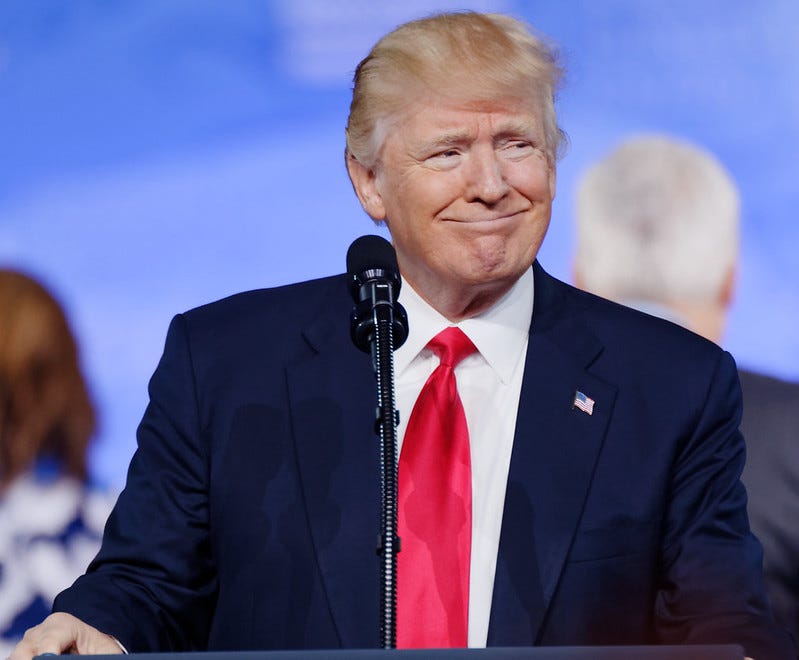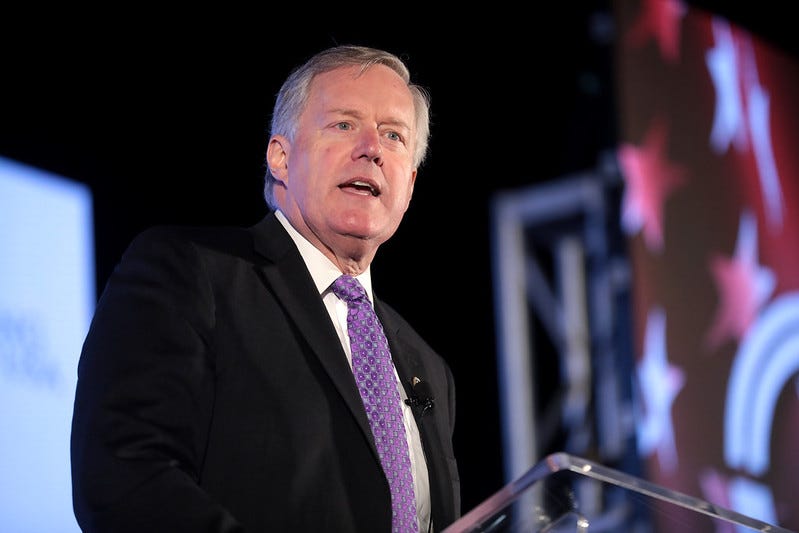Wake Up To Politics - April 26, 2022
Wake Up To Politics: Musk, Twitter, and Trump
by Gabe Fleisher
Good morning! It’s Tuesday, April 26, 2022. Election Day 2022 is 196 days away. Election Day 2024 is 924 days away.
The politics of Elon Musk’s Twitter takeover
Twitter is not a big platform, relatively speaking.
On the list of social networks with the most monthly active users, Facebook reigns supreme at 2.9 billion. YouTube is just below that at 2.6 billion, Instagram is a little farther down at 1.5 billion. In just a few years, TikTok has climbed to 1 billion monthly active users.
And then, down past all those sites and a bunch more, is Twitter at 436 million monthly active users.
What’s more, per a 2021 analysis by Pew Research Center, 97% of all tweets are produced by just 25% of Twitter users — meaning a small fraction of people are driving most of the conversation on the website.
But where Twitter lacks for users, it makes up for it in political influence and relevance.
In recent years, Twitter has cemented its place as the town square of modern political discourse, with an outsized sway over political discussions and policymaking in the United States.
By and large, political journalists are glued to Twitter. At the same time, politicians increasingly are increasingly using the platform to circumvent the media and connect with their constituents (and raise money); in recent years, tweets have helped fuel the rise of politicians from Donald Trump to Alexandria Ocasio-Cortez.
Which is why Elon Musk’s purchase of Twitter for a clean $44 billion — announced on Monday — is not just a business story, but a political one as well.
On a personal level, Musk’s politics are hard to nail down. The Tesla CEO and PayPal co-founder — who is now the world’s richest man — has donated to candidates in both major parties; in 2020, he gave to Sens. John Cornyn (R-TX) and Thom Tillis (R-NC), but also to Sens. Jeanne Shaheen (D-NH) and Gary Peters (D-MI).
But on cultural issues, he’s often found common cause with the right, blasting Covid-era lockdown orders as “fascist” and last year moving Tesla’s headquarters from Democratic-controlled California to Republican-controlled Texas.
He’s also emerged as a stalwart advocate for free speech, echoing conservative criticisms that social media platforms — like Twitter, soon to be his — have censored right-wing views.
Here are four ways Musk’s Twitter purchase could impact politics:
1) Who uses the platform. Twitter’s use base is currently disproportionately Democratic, but based on the partisan reactions to the sale, that could change in the Musk era.
“We’re back,” Fox News host Tucker Carlson tweeted on Monday, after going a month without tweeting in protest of Twitter removing one of his posts. A slew of Democrats, meanwhile, are threatening to leave the platform now that Musk is taking charge.
Again, this matters politically because of Twitter’s influence over the political set in Washington; what’s on Twitter can often drive political coverage, so which party dominates the Twitter conversation will likely have an effect on how journalists, pundits, and pols view the political landscape.
2) Trump could come back. One of the things Musk plans to change about Twitter is its content moderation policies, which could mean lifting bans on a long list of right-wing figures, including some who have promoted hate speech or misinformation about Covid.
The most prominent of those figures? Former President Donald Trump. He told Fox News on Monday that he would not come back to Twitter even if Musk lifts the ban on his account... but many of his own advisers don’t believe him.
If Trump — the self-described “Ernest Hemingway of 140 characters” — comes back to Twitter, it could end up hurting him more than it helps: many Republicans are afraid of the damage Trump could to do the party (and himself) if he is unleashed on Twitter once again.
3) It would scramble congressional oversight. In recent years, hearings with social media CEOs have become big spectacles on Capitol Hill. While leaders of both parties have called for increased social media regulation, it’s Republicans who have made targeting Big Tech (especially Twitter) a centerpiece of their 2022 platform.
The House GOP was set to launch high-profile investigations of Twitter censorship if they retook the majority this year; in a world with Twitter as a Musk-run free speech haven, Republicans could shift their rhetoric on Big Tech and Democrats could become the party more concerned with regulating such companies and reforming Section 230.

4) Say goodbye to Truth Social. Remember Truth Social, Trump’s new competitor to Twitter? Not many people do: the nascent platform had already been flailing, plagued by glitches and lacking much of a user base.
The Twitter/Musk news means Truth will probably never get off the ground, since conservatives are likely to flock back to Twitter. Already on Monday, shares of the company merging with Trump’s social media firm fell 13%.
In fact, Musk’s takeover of Twitter will likely prove similarly damaging for other right-wing alternatives Twitter, like Parler and Getter. One interesting possibility to watch: will roles reverse, and will liberals create their own ecosystem of alternatives to Twitter in the coming months, as conservatives did on the pre-Musk era?
Only time will tell. For the record, Musk says he wants people of all political stripes to be welcome on his platform. “I hope that even my worst critics remain on Twitter, because that is what free speech means,” Musk said — how else? — in a tweet on Monday.
Catch up
What else you should know this morning.
— President Biden issued his first acts of clemency since taking office this morning. He commuted the prison sentences of 75 nonviolent drug offenders and granted three pardons, including to a former Secret Service agent.
— A New York judge held former President Trump in contempt on Monday. Per the judge’s ruling, Trump will be fined $10,000 a day until he complies with a subpoena for his business records from the New York attorney general.
— A federal judge blocked the Biden administration from lifting Title 42, the pandemic-era order allowing for migrants to the U.S. to be swiftly expelled. The judicial decision comes as Republicans and even many Democrats have criticized Biden’s plans to lift the order.
— New text messages offer details on the Trump inner circle’s efforts to overturn the 2020 election and their response to the January 6 attack. CNN obtained the texts, which were given to the January 6 committee by former White House chief of staff Mark Meadows; they show Meadows corresponding with a range of activists and lawmakers before, during, and after the attack.

Look ahead
How your leaders in Washington are spending their time today. (All times Eastern)
Biden and Harris: Receiving their daily intelligence briefing (10:15 am).
Also at the White House: Press secretary Jen Psaki will hold the daily press briefing (3 pm). Dr. Ashish Jha, who recently joined the White House as the new Covid-19 response coordinator, will also take questions.
Senate: Holding weekly caucus meetings (12:30 pm). Voting to confirm Lael Brainard as the Vice Chair of the Federal Reserve Board of Governors (2:15 pm). A cloture vote to advance Lisa Cook’s nomination to be a member of the Fed board is also possible.
Plus, the chamber may also vote on S.J.Res.41, which would invoke the Congressional Review Act to repeal a Biden administration regulation on abortion. Here’s what it does:
Under the Affordable Care Act (aka Obamacare), health insurance plans can cover elective abortions (those that aren’t due to rape, incest, or saving the mother’s life) — but they must charge at least $1/month for that coverage.
A Trump-era rule required insurance to also send a separate invoice for that extra charge if they cover elective abortions; the Biden administration then issued a rule repealing the invoicing requirement, which is the rule being voted on today.
House: Voting on 14 bills under “suspension of the rules,” a process that allows uncontroversial bills to be fast-tracked in the House if they receive two-thirds support.
Five are focused on small businesses: H.R. 6445, the Small Business Development Centers Improvement Act; H.R. 6441, the Women’s Business Centers Improvement Act; H.R. 6450, the SCORE for Small Business Act; H.R. 4877, the One Stop Shop for Small Business Compliance Act; and H.R. 6454, the Small Business Advocacy Improvements Act.
Three are focused on historic sites: S. 270, the Brown v. Board of Education National Historical Park Expansion and Redesignation Act; H.R. 3525, the Commission to Study the Potential Creation of a National Museum of Asian Pacific American History and Culture Act; H.R. 6201, the National Liberty Memorial Preservation Act.
Three are focused on fish and wildlife: H.R. 5973, the Great Lakes Fish and Wildlife Restoration Act; H.R. 6651, the Alaska Salmon Research Task Force Act; and S. 497, the American Fisheries Advisory Committee Act.
Two are focused on conservation: H.R. 2793, the Highlands Conservation Reauthorization Act; H.R. 6023, the Multinational Species Conservation Funds Semipostal Stamp Reauthorization Act.
One is focused on tribal lands: H.R. 441, the Don Young Alaska Native Health Care Land Transfers Act.Also at the Capitol: Secretary of State Antony Blinken will testify before the Senate Appropriations Committee (10 am) and Attorney General Merrick Garland will testify before the Senate Foreign Relations Committee (10 am).
Both hearings are technically about their agencies’ budgets, but expect both to face questions on hot-button issues like Ukraine for Blinken and the January 6 investigation for Garland.

Supreme Court: Hearing oral arguments in a case on immigration (10 am) and another on prisoner rights (11 am).
The immigration case is Biden v. Texas, in which Texas and Missouri are attempting to block the Biden administration from overturning the Trump-era “Remain in Mexico” policy, which requires asylum seekers to stay in Mexico while their applications are considered by an immigration judge.
The prisoner rights case is Shoop v. Twyford. The case grapples with whether and when a federal court is authorized to “compel a state official to transport a prisoner so he can develop evidence he might later use to challenge his state-court conviction or sentence,” according to SCOTUSBlog.
Links to watch for yourself: WH briefing • Senate session House session • Blinken hearing • Garland hearing • Biden v. Texas arguments • Shoop v. Twyford arguments
That’s it for today. If you enjoy Wake Up To Politics, it’s always appreciated if you donate to support the newsletter or buy some merch. Or if you tell your friends and family to sign up at wakeuptopolitics.com.
If you have any questions or feedback, feel free to email me: my inbox is always open.
Thanks for waking up to politics! Have a great day.
— Gabe






